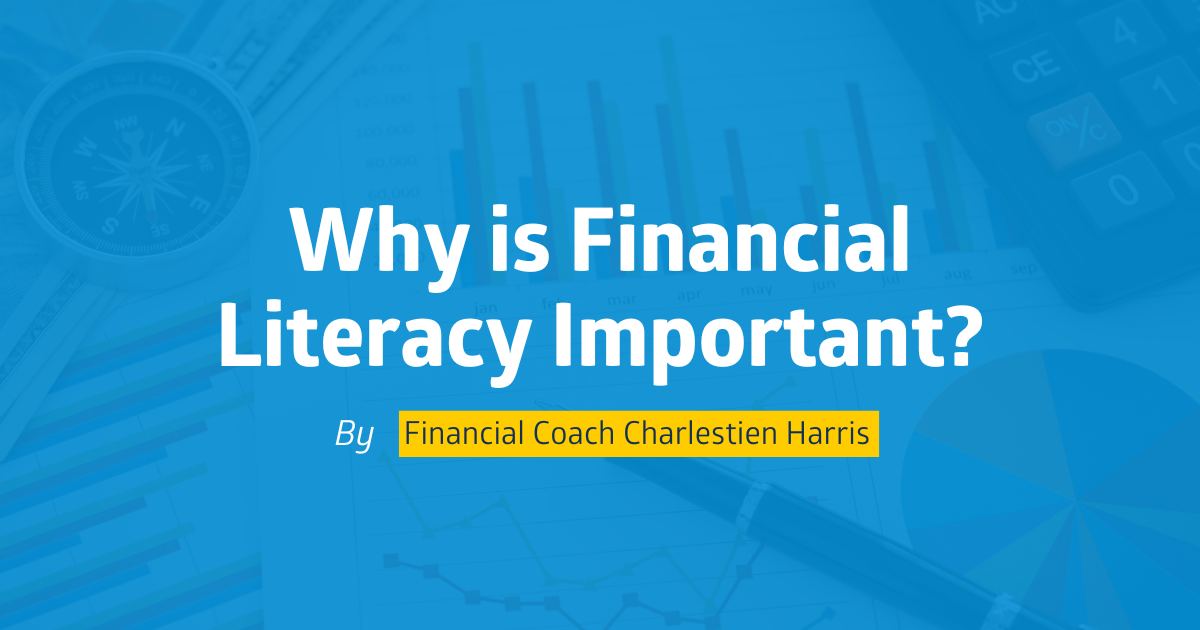By Charlestien Harris
April is Financial Literacy Month! This has long been a nationally recognized holiday, representing our collective dedication as a country to the importance of being financially literate.
I guess the question that I want to ask most is – with what financial decision would you like to be more literate? I would like to start by defining what being financially literate means. Financial literacy is the ability to read, write, and speak about one’s financial situation in order to make sound fundamental financial decisions. I know that sounds like a mouthful, but it is important for you to know the condition of your financial situation so you can live a healthy and wealthy life, knowing that your finances are in good condition.
So, why does being financially literate matter so much? Here are five of the top reasons why.
- Personal finance remains the number one topic of argument within a marriage. Different attitudes towards money can be a significant source of financial conflict in marriages. Spouses may have different spending habits, saving goals, and financial priorities. Financial disagreements happen over everything from past financial mistakes, such as defaulting on a loan, to money management style differences, such as one partner being a saver while the other is a spender. When you’re married, all of your financial decisions, both past and present, have an impact on your spouse. One way to learn more about your spouse’s finances is to sit down together and write your individual money stories and read them together. This will help you both get a better understanding of how and why you handle your personal finances the way you do!
- Parents rank teaching financial responsibility to their children near the top of their wish list. Raising money-smart kids does not have to be a difficult task. All is not lost! It does not have to be a wish only, but you can make that wish become reality! There are so many financial resources and apps available to assist a parent with teaching their child to become financially savvy, and there is a plethora of financial topics to choose from. A great way to teach your children about money is by including them when paying bills or discussing large purchases. Family financial meetings can be a way of teaching children about the financial choices you make and why you make them. Depending on the age of the children, try to put it in terms of what they can understand.
- Poor financial literacy leads to poor decision-making, which leads to poor behavior, limiting the household’s ability to reach its financial goals. I won’t say that being financially literate will automatically make you rich, but having that extra knowledge under your belt will help you better manage the finances you have, and hopefully, it will help you improve your financial well-being. The lack of financial literacy can lead to many unintended negative impacts on an individual’s financial status, such as high debt accumulation, either through poor spending decisions or a lack of long-term preparation. This, in turn, can lead to poor credit, bankruptcy, housing foreclosure, or other negative consequences when it comes to handling personal finances. The effects of a lack of financial literacy can include such consequences as not having enough emergency savings, which could cause financial hardship in the event of a job loss, a major medical emergency, or a large car repair bill, and also having a credit card balance you can’t pay off each month, which could add up to increased interest charges.
- A strong foundation of financial literacy can help support various life goals, such as saving for education or retirement, using debt responsibly, and running a business. This reason is just the opposite of what I mentioned above. Having a strong foundation of financial topics can definitely prepare an individual to navigate the financial pitfalls that can be waiting for a person who is not financially literate. Even with a small amount of personal knowledge, individuals can avoid making mistakes by consulting with those who are more knowledgeable, including financial professionals. Southern Bancorp has four certified financial counselors on staff who are ready and waiting to assist you with improving your financial well-being. You can find this resource at https://southernpartners.org/counseling-services/.
- Financially literate people are generally less vulnerable to financial fraud. The impact of fraud goes well beyond financial loss. Fraud can affect people, industries, entities, services, and the environment. Understanding the total impact of fraud allows not only businesses but also individuals to make better-informed financial decisions. Serious impacts can arise from any type of fraud, whether it’s conducted by unscrupulous individuals or serious and organized crime groups seeking to steal valuable financial information to use personally or to sell on the black market for profit. Contrary to what one might think, fraud is not a victimless crime. Fraud can be a totally traumatic experience that often causes real and irreversible impacts for the victims, their families, job-seeking opportunities, and the communities they live in.
Whatever the reason you choose, take advantage of the opportunities this year to get involved in the financial literacy and capability movement to improve your level of financial knowledge. April would be a great month to start, but any time of the year would be a great time to begin your journey to a brighter financial future. Not only for yourself but for generations to come!
For additional information on this and other financial topics, visit our blog at banksouthern.com/blog, email me at Charlestien.Harris@banksouthern.com, or call me at 662-624-5776.
Until next week – stay financially fit!
